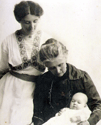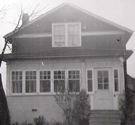
 .
.
Growing up in England, I was very aware of the British and European experience of the Second World War, but I wanted to find out how my parents had experienced the war in Canada. My father made the point to me that many people don't realize Canada had even been involved in World War II. Far from being a distant event, however, I discovered that the war had a big impact on both their lives.
My father was three years old when the war started, and despite his young age, has a very clear memory of the outbreak of war
" I can remember being in my room, being in bed and my grandfather was there, my father’s father, James Theodore and he was talking with my Father and my Mother and I knew as a child sometimes knows, that there was something quite different about the tone of the conversation and the sort of atmosphere of fear that there was and so I have a very distinct memory of being disturbed by the outbreak of war.
"Obviously as I got older and older, I began to realise what the war was about and you’d see maps in the newspaper, newscasts would feature items obviously about the war and this introduced you to politics and to the ideas of freedom versus fascism and the awfulness of Hitler as a foe. By 1945 as the war in Germany gradually was winding down, it had become a concept I had to sort of wrestle with and understand and especially after the horrible, horrifying details about the holocaust came into view it was hard to comprehend for a nine year old as I was in ‘45. I think fundamentally when I later became a historian, I think I was trying to answer the question of why these things had happened."
For my mother, the war brought disruption to family life as her Father volunteered to join the Royal Canadian Airforce as a clergyman. While the war for him was "the big adventure of his life" for her Mother, the war meant leaving a place where the family had been happy:
"So when he left to join the air force, there was much wailing and sorrow, we had lots of good friends there...The people were very sorry to see them go and Mother had to go back and live with her parents in a Toronto suburb on the lake shore. We lived there with my Mother's younger sister, Catherine. Her husband was in the army.
..
They had got married when I was four. I vividly remember the wedding because it was in our house. My grandfather did the ceremony in our living room and my uncle was there in full army gear with his strap across his uniform."
"So there you were, what you might call war widows with their mother and father. My grandfather died during this period so we were a house full of females and my baby brother so it was quite a strange life but it was like everybody else, all the children. When I started school in New Toronto, hardly anybody had a Dad, you know, I don't remember anybody having a Father"
My Mother was also very conscious of the war, growing up:
"When you're six, you're fully aware of what's going on, I can remember hearing the radio and it was the news and it was serious. .We would always play that we would capture Hitler and we didn’t go to the cinema very often but if we did go, and there were always, you know, (on the cinema screen), refugees trudging along in Poland and you were very aware of it.
"And my next neighbour, my great friend, Mary Coates, that I played with outside of school was..I was six and she was probably 10. We alternated between doing war things and playing Arabian knight sort of dramas which we starred in her garage because again, everybody had a car which you couldn’t drive because you couldn’t get petrol.The other thing that was interesting is the signficance of the telegram in a society like that because it was often bad news. There were alot of telegrams and if you got a telegram, people were nervous about opening the door."
My Father has a very vivid childhood memory which occurred when he was employed by a neighbour to deliver telegrams. Click on the control panel below to listen to him talking about it and read the transcript below.
"I knocked on the door and she saw me and she saw that I was carrying this significant envelope and she burst out crying, she just was uncontrollably weeping and of course she thought that her son who was in Europe, that I was bringing a letter saying that he'd been killed....My understanding later was that she had already lost one son in the war and I don't know whether that was the reason why this was also so very poignant for her. But for me it was very upsetting because I don't think I quite understood why it was that my appearance would cause such distress. Anyway, thankfully when she finally gained control of herself enough to look at this message it was not as she feared but the tears of joy then replaced the tears of apprehension, but that's another memory I have of the emotions of war and the losses that could be incurred by people..."

Jim Sturgis aged 9
